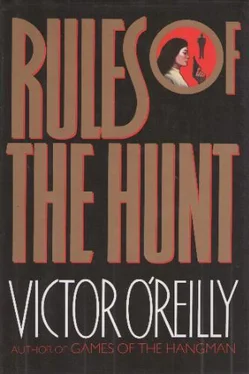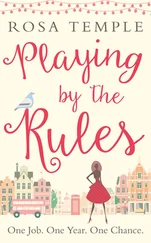Victor O'Reilly - Rules of The Hunt
Здесь есть возможность читать онлайн «Victor O'Reilly - Rules of The Hunt» весь текст электронной книги совершенно бесплатно (целиком полную версию без сокращений). В некоторых случаях можно слушать аудио, скачать через торрент в формате fb2 и присутствует краткое содержание. Жанр: Триллер, на английском языке. Описание произведения, (предисловие) а так же отзывы посетителей доступны на портале библиотеки ЛибКат.
- Название:Rules of The Hunt
- Автор:
- Жанр:
- Год:неизвестен
- ISBN:нет данных
- Рейтинг книги:4 / 5. Голосов: 1
-
Избранное:Добавить в избранное
- Отзывы:
-
Ваша оценка:
- 80
- 1
- 2
- 3
- 4
- 5
Rules of The Hunt: краткое содержание, описание и аннотация
Предлагаем к чтению аннотацию, описание, краткое содержание или предисловие (зависит от того, что написал сам автор книги «Rules of The Hunt»). Если вы не нашли необходимую информацию о книге — напишите в комментариях, мы постараемся отыскать её.
Rules of The Hunt — читать онлайн бесплатно полную книгу (весь текст) целиком
Ниже представлен текст книги, разбитый по страницам. Система сохранения места последней прочитанной страницы, позволяет с удобством читать онлайн бесплатно книгу «Rules of The Hunt», без необходимости каждый раз заново искать на чём Вы остановились. Поставьте закладку, и сможете в любой момент перейти на страницу, на которой закончили чтение.
Интервал:
Закладка:
Katsuda picked up the phone.
Fitzduane looked up from his Japan Times as Adachi made his way across the floor of the hotel restaurant.
The remains of his Western-style breakfast, except for his tea and toast, were cleared away as the policeman approached.
"Good morning, Adachi- san," said Fitzduane, waving the policeman to a chair. "You have a look about you that suggests developments."
A waiter rushed up and brought Adachi some green tea. The service was excellent in Japan, Fitzduane had found, though the language barrier could be a problem. His waiter, for instance, was convinced that hot milk was what the Irish gaijin required with tea, and he would not be persuaded otherwise. Still, that slight eccentricity notwithstanding, Fitzduane felt he was in good hands.
"Would you ever think of trying Japanese food, Fitzduane- san?" said Adachi. He was used to gaijins demonstrating their skill with chopsticks and endeavoring, unsuccessfully, to be more Japanese than the Japanese when it came to food. Fitzduane, in contrast, asked for a knife and fork and did not seem to feel he had to prove anything. Sometimes he ordered Japanese dishes, but mostly he ordered Western. It was easy to do so in Tokyo. Practically every type of national cuisine was represented there. "Fish, rice, vegetables and seaweed," continued Adachi. "It is a very healthy diet."
"A vicar was once served a dubious egg for breakfast," said Fitzduane, "and was then asked if everything was satisfactory. He replied, ‘Good in parts.’ Well, that is pretty much my impression of Japanese food." He smiled. "Though it is all superbly presented – a feast for the eye. Unfortunately, my taste buds do not always agree. They have a weakness for French and Northern Italian cooking, with forays into Indian and Chinese and the occasional medium-rare steak. Doubtless, they need further education."
Adachi laughed. He had been skeptical of the DSG's initiative in bringing a foreigner into what, in his view, was a Tokyo MPD affair, but Fitzduane, for a gaijin – a fundamental qualification – was an agreeable surprise.
Despite their unfortunate introduction, Adachi found the Irishman easy to get along with. He had a generous, low-key personality that invited confidences and he was sensitive to nuance, to the unspoken word. Also, his style was intuitive. He could almost have been a Japanese in his respect and understanding for giri-ninjo, yet he was very much his own man.
Adachi was somewhat puzzled by his own reactions to the man. As a Tokyo policeman, profoundly opposed to violence, he could not forget the carnage the Irishman had wrought the day they had met, yet Adachi still found he greatly enjoyed the man's company. Here was a man whose personal code seemed to reflect the most human of values, yet who killed without hesitation and without visible remorse. Adachi had never met anyone quite like him before.
"The two yakuza of the Insuji-gumi who you captured, Fitzduanesan," said Adachi, "have confessed." He did not sound surprised. It had been over a week since the botched assassination attempt. Fitzduane tried to imagine what a week of Japan's famous draconian police-custody system would have been like, under these rather embarrassing circumstances for the Tokyo MPD, and decided he did not particularly want to find out, nor was he overly sympathetic. It was hard to feel much about people who tried to kill you.
Fitzduane nodded. Adachi was slightly taken aback at Fitzduane's lack of reaction. It was yet another example of the man's atypical behavior. In his experience, most gaijin were surprised and sometimes shocked at how consistently Japanese police were able to get criminals to confess. They would raise questions of civil rights and habeas corpus and all kinds of legal mumbo jumbo, as if the rights of the victims and ordinary citizens were not an issue also. In Adachi's view, the West were hypocrites and had their priorities backward.
"The two yakuza," continued Adachi, "made separate confessions and have now signed statements. The contract on you, Fitzduane- san, was initiated by Kitano- san, the security chief of the Namaka Corporation. He personally briefed the killing team."
Fitzduane raised his eyebrows. "You surprise me, Adachi- san. Why would he get involved personally? Isn't a cutout the normal procedure? Hell, this links the assassination attempt directly to the Namakas. It sounds too good to be true."
Adachi shook his head. "Unfortunately, Fitzduane- san," he said, "this development is not all to our advantage. Yesterday, just prior to the yakuza confessions, we also received a written complaint from the Namaka brothers about their security chief, reporting their suspicions that he had been using his division for his own private advantage and also accusing him of embezzling company funds. Early this morning, we attempted to arrest Kitano. We were not successful. Instead we found him and his wife dead and a brief suicide note. In the note he stated that he had disgraced his entirely innocent employers by carrying out criminal activities and associating with terrorists. Yaibo was specifically mentioned. Effectively, the trail ends with Kitano. The evidence, regarding the attempts on your life at least, no longer points to the Namakas – whatever we may suppose."
"How did Kitano and his wife die?" said Fitzduane. "Could the suicide have been faked?"
"We have already carried out an autopsy," aid Adachi, "and although the results of some tests still have to come in, the findings seem fairly conclusive. The woman was shot in the back of the neck at close range by a. 45 U.S. Army Colt automatic as she knelt on the floor. Kitano then placed the barrel of the same weapon in his mouth and pulled the trigger. There are no signs of a struggle, and there is evidence that Kitano fired the weapon with his right hand. And though the note was typed on a word processor, it was signed and we have verified the signature. The evidence says suicide."
"Was the weapon his?" said Fitzduane.
Adachi smiled. "Fitzduane- san, you already know how hard it is to own a legally registered gun in this country. No, although Kitanosan was head of security, he was not licensed to carry a firearm. However, there is a black market in such weapons, and all too many are in circulation as a result of the U.S. force's presence and smuggling. Regrettably, the yakuza are tending to use firearms more frequently than they used to and their ownership is something of a criminal status symbol."
"Leaving evidence aside, Adachi- san," said Fitzduane, "what do you think about the Namakas themselves? Were they behind the various assaults on me? Are they really responsible for the Hodama killing? Perhaps they are really the high-minded captains of industry they purport to be, and all of this is a smear caused by a renegade employee."
"I'm a policeman, Fitzduane- san," said Adachi, "and I have to go by the evidence. The fact is there is now no evidence at all linking the attacks on you with the Namakas. Instead we have a culprit, the late Kitano- san, with the means, motive, and opportunity – and a signed confession. As to Hodama, the evidence against the Namakas did appear strong, but on closer examination, I'm not so sure."
"You're still not saying what you think, Adachi- san," persevered Fitzduane, but gently. " Go-enryo-naku – please do not hold back."
Adachi smiled at Fitzduane's Japanese, but not at the thoughts he was expressing. The Irishman was touching on the amae element of a relationship – roughly translated as ‘childlike dependence’ – so important in Japan, which results in shinyo – absolute confidence in another person, confidence not only in his or her integrity but also that such a person will do whatever is expected, whatever the cost. Such a trust normally took years to develop in Japan, but curiously Adachi felt that he could have shinyo in Fitzduane.
Читать дальшеИнтервал:
Закладка:
Похожие книги на «Rules of The Hunt»
Представляем Вашему вниманию похожие книги на «Rules of The Hunt» списком для выбора. Мы отобрали схожую по названию и смыслу литературу в надежде предоставить читателям больше вариантов отыскать новые, интересные, ещё непрочитанные произведения.
Обсуждение, отзывы о книге «Rules of The Hunt» и просто собственные мнения читателей. Оставьте ваши комментарии, напишите, что Вы думаете о произведении, его смысле или главных героях. Укажите что конкретно понравилось, а что нет, и почему Вы так считаете.




![Беар Гриллс - The Hunt [=The Devil's Sanctuary]](/books/428447/bear-grills-the-hunt-the-devil-s-sanctuary-thumb.webp)







